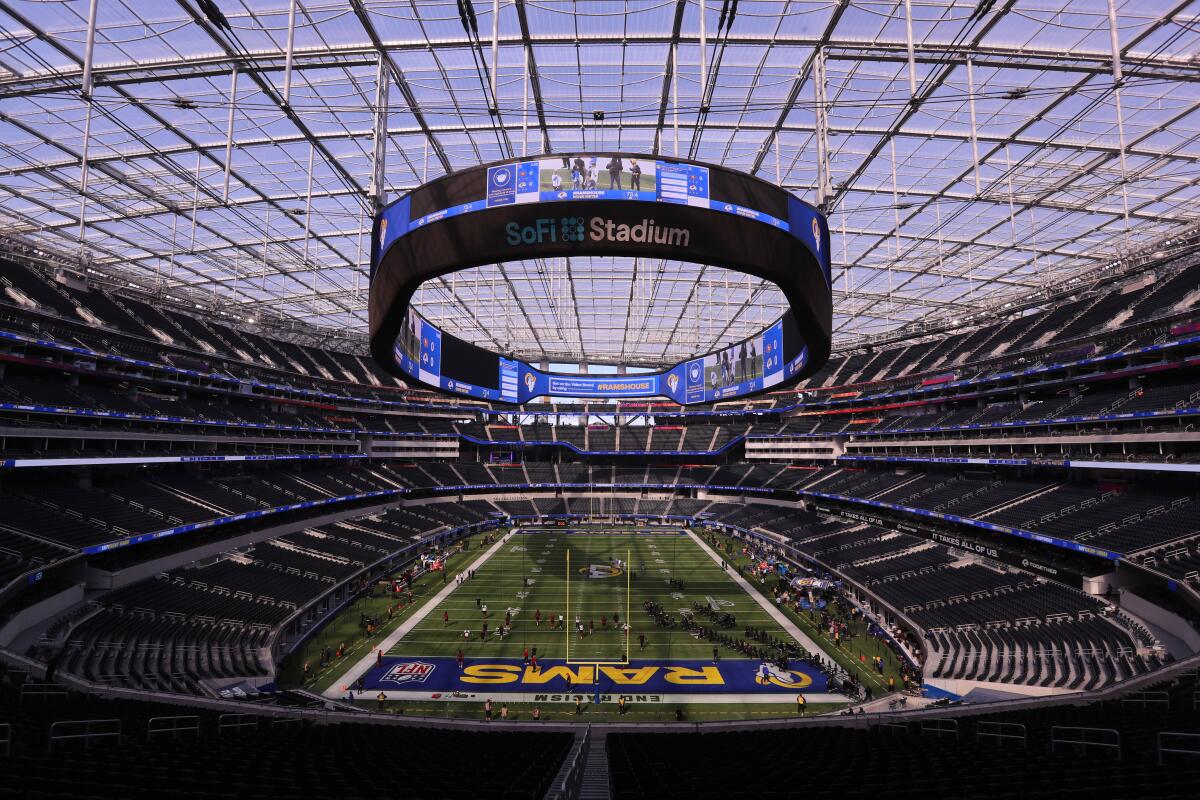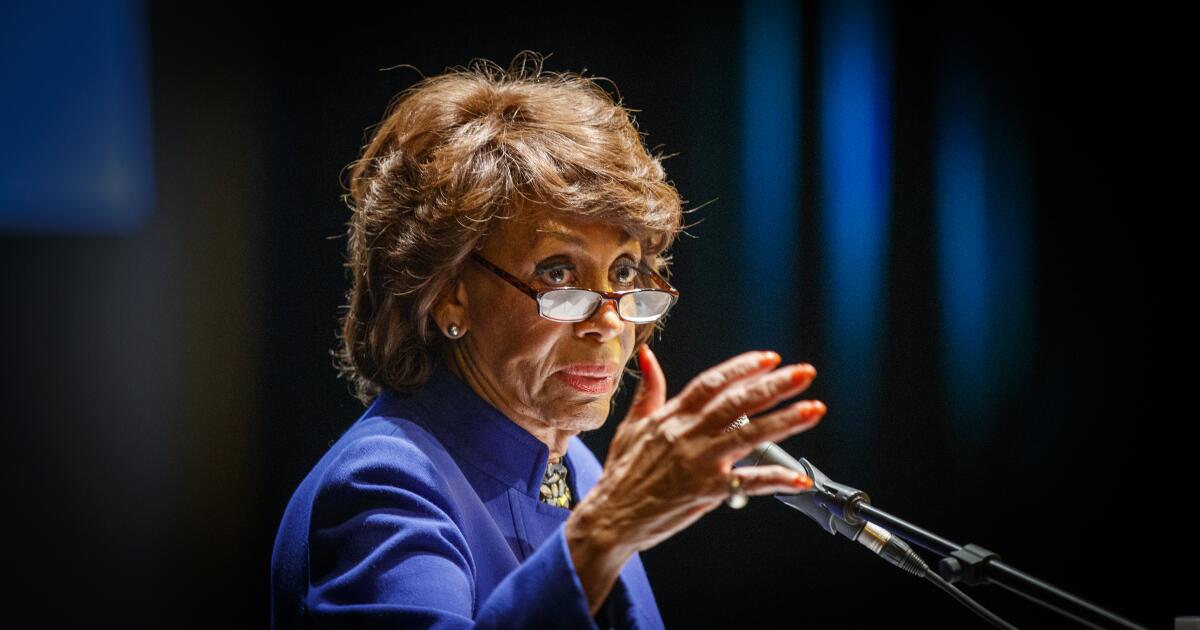Rep. Maxine Waters is working to block plans for a $2 billion people mover that would connect SoFi Stadium to Los Angeles’ newest rail line, a project she calls “ridiculous.”
“Anything we can do to stop this, we will do it,” she said Wednesday. “This has proven to be a totally unnecessary and far too expensive project.”
The veteran council member argues that an elevated people mover, once touted as a centerpiece of the 2028 Olympics, won’t serve people living in working-class but gentrifying communities, and she suggested the Inglewood Transit Connector (ITC) would do a better job of transporting fans to the multi-billion-dollar stadium complex that has come to dominate this city of 107,000.
In a letter to Transportation Secretary Pete Buttigieg last week, Sen. Waters (D-Los Angeles) argued that the money would be “better spent on programs that improve access to affordable housing.”
“It does not provide local residents with a convenient connection to jobs or public services,” she said. “The ITC is designed primarily to allow transit users to use a 1.6-mile extension from Metro’s K Line to sports and entertainment venues. A shuttle bus could conceivably accomplish the same purpose at a fraction of the cost, but has never been seriously considered as an alternative.”
Buttigieg’s federal agency has pledged $1 billion to the project, roughly half the expected cost, but after the letter was sent to members of a House Appropriations subcommittee, Rep. Steve Womack (R-Arkansas), the subcommittee chairman, removed the full funding installment of $200 million from his draft budget bill.
The final bill still needs to be worked out in the Senate, where it may be subject to change. Sen. Alex Padilla, D-Calif., has supported the project in the past but did not respond to a request for comment Wednesday.
The project’s cost estimate has doubled, and delays have made it unclear whether it can actually be completed in time for the 2028 Olympics.

A view of SoFi Stadium in Inglewood, where a $2 billion people mover is slated for construction but which Rep. Maxine Waters, who represents the area, opposes.
(Allen J. Schaven/Los Angeles Times)
Waters noted that home prices in the Los Angeles metropolitan area have risen 37 percent in four years, and rents have skyrocketed, leading to increased evictions, debt and homelessness.
“The ITC threatens to exacerbate this crisis by displacing longtime Englewood residents, small businesses and minority-owned businesses and diverting resources from some of the most urgent needs of the communities in my district,” she wrote.
Ms. Waters’ opposition has pitted her against another longtime black politician in the area, Inglewood Mayor James Butts, who is the plan’s creator and biggest supporter as a four-term mayor who transformed his community by wooing billionaires and awarding contracts to build SoFi Stadium and the Intuit Dome.
“You can’t come in at the last minute and come up with some fairy tale story about how terrible things are,” he said, calling the letter “poorly thought out” and many of its points “completely invalid.”
Butts told The Times that Waters had not contacted him to discuss the matter.
He asked: “Would anyone lobby against a project that would last five or six years and provide 17,000 people with prevailing wage jobs?”
He noted that the project is estimated to increase ridership on the Metro K Line by 2,400 to 3,300 passengers per day on event days, bringing 25,000 riders to the Metro system, and that the project has broad support and is under review by federal regulators.
“This is a catalyst for Metro,” Butts said. “It reduces greenhouse gases and takes cars off the road. It eliminates impacts to Inglewood residents on game and concert days.”
The fight over the project comes just over a week before the opening of the Paris Olympics, a move that Los Angeles Mayor Karen Bass and other city officials are watching closely as they face growing pressure to prepare for an Olympics that has drained the coffers of other host cities. City leaders have vowed not to spend money on building Olympic venues, but expanding bus service for the event is estimated to cost $1 billion.
Some critics have called the new line an expensive perk promoted because of the Olympics, and it’s not scheduled to open until 2030, according to federal government documents.
The fully automated, three-stop people mover is designed to transport fans through downtown Inglewood to SoFi, Kia Forum and the soon-to-open Inuit Dome.
Jeff Davis, a senior fellow at the Eno Center for Transportation, a think tank, said the project is being fast-tracked because of the Olympics and the stadium’s owners will be able to shoulder more financial responsibility. The Eno Center estimates the project would cost $470,000 per estimated daily passenger, far more than other federally funded transportation projects.
“Rather than connecting an underserved neighborhood, this project is intended to connect the new Rams Stadium to the adjacent office and entertainment complex,” he wrote in March.
Davis said Rams owner Stan Kroenke, who also developed SoFi Stadium and the surrounding entertainment complex, would benefit from the rail line when it is completed, and raised the question of how much the real estate industry should contribute to the increased value that the rail line would bring.
The opposition marks a major turning point for Waters, who wrote in support of a $20 million subsidy for the line three years ago. Waters said she changed her mind after learning that the line would force dozens of businesses to relocate and cost more than twice as much per station as the nearby K Line.
“They should have paid attention sooner and we wouldn’t have found out so much later,” she said.
“When voters look at how we make decisions and what our priorities are, this is a terrible example.”
Times reporter Liam Dillion contributed to this report.

